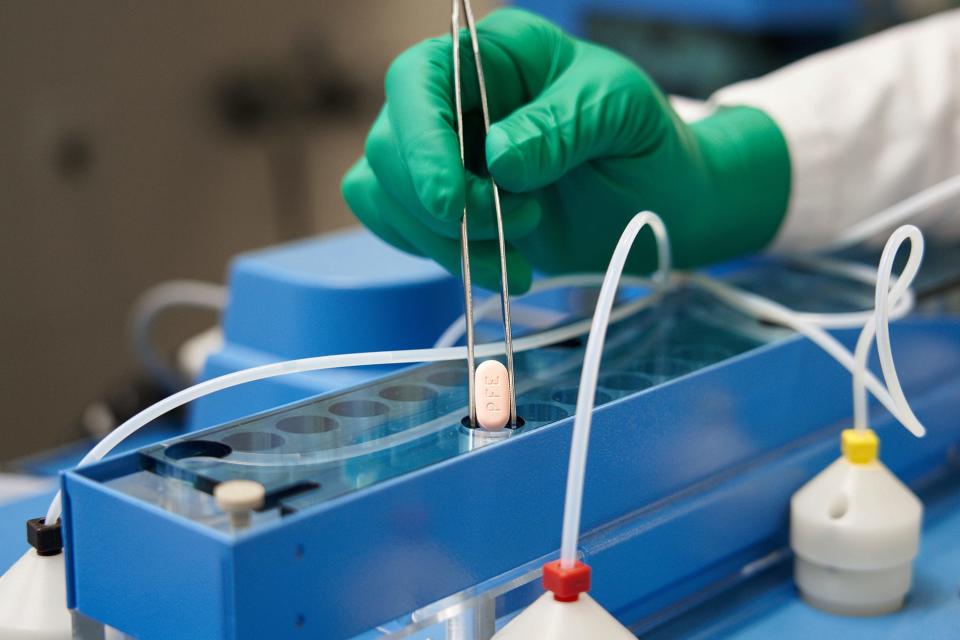Doctor: Patients discharged after COVID are so sick they're returning to the hospital
- Oops!Something went wrong.Please try again later.
On Monday morning, Des Moines writer Andie Dominick caught up again with Dr. Tom Benzoni, a local emergency room physician, to talk about the coronavirus pandemic. He has been interviewed for the Register numerous times since the coronavirus pandemic hit Iowa.
Here are previous installments from 2020 on March 31, April 28, May 12, May 26, June 8, June 21, July 1, July 18, Aug. 10, Aug. 24, Sept. 11, Oct. 30, Nov. 16, Dec. 16, and 2021 on Jan 7, Jan. 26, Feb 22, March 22, April 15, May 11, June 1, June 23, July 24, Aug. 15, Sept. 13, Oct. 22 and Dec. 4.
Here are edited excerpts from the Dec. 27 conversation:
You worked two shifts in two different hospitals over the past 21 hours. Tell me about a few COVID patients.
One unvaccinated, middle-aged guy had been recently discharged from the hospital and came back because he couldn’t breathe. He was weak, needed oxygen and had leg pain.
In the ER, his legs suddenly turned white and cold. That’s what you see in people with atrial fibrillation who get clots in arteries. It ended up, this guy had a clot in his aorta and was shooting clots down his legs.
That means blood thinners and surgery, and I don’t know his prognosis.
Put a push pin in this, because I think we’re going to have a raft of people who survived this virus in their 30s to 50s and have life-long pulmonary vascular disease. Some may be on oxygen the rest of their lives. Some may need lung transplants, and you don’t get a lung transplant unless someone else dies.
Other patients?
Right across the hall was a younger fellow with low oxygen. His skin was gray and he had chest pain so we had to check him for blood clots. There was a 70-something vaccine denier with lungs full of COVID.
All three unvaccinated?
All three were unvaccinated, had already been hospitalized and were so sick they had to be readmitted.
More: Iowan dies after a 15-day wait for a medical center bed. His survivors blame the COVID surge
More: Iowa hospitals brace for omicron wave even as the number of hospitalized COVID-19 patients drop
I hadn’t thought about COVID hospitalization numbers reflecting repeat patients. Explain again why infected people develop blood clots.
In the lining of all blood vessels, there are receptors. COVID’s famous spike protein fits into them like a key into a lock. The virus can bind anywhere you have blood vessels — which is everywhere except your hair and fingernails.
So we shouldn’t be surprised those infected with COVID have everything from altered mental status to swelling to clots.
Are you admitting any vaccinated people?
I’ve admitted a few elderly people who are vaccinated, but they get admitted for everything. Generally, the people sick enough to need to stay in the hospital are not vaccinated.
I’m finally realizing something about the anti-vaxxers and all their “sheeple” stuff. They call vaccinated people sheep, but they themselves are the sheep — ones led by bad shepherds.
Do any of these patients say they regret not being vaccinated?
The vast majority of them are experiencing what I call implication bias. Once you’ve laid down a path, it’s much easier to continue that path than to examine it. If you ask “am I right?” then a possible answer is “no.” Who wants to live the life of a moron?
I’ve talked to a few people who report lymph node swelling after booster shots.
First, let’s be clear about correlation and causation. We connect things that are unconnected in order to create coherence. The person with swollen lymph nodes may have flipped a light switch, but the light switch didn’t cause the swelling.
Then again, it’s perfectly logical the vaccine would cause swollen glands, partially in the area where the vaccine drained, like the left armpit if you got your shot in your left arm. The vaccine moves through your lymphatic system, and the factory making antibodies is in the lymph tissue.
More: WHO director-general: Pandemic won't end until rich countries stop hoarding vaccines
More: Spending Christmas weekend alone with COVID made me hope next year goes better
Can you explain how Pfizer’s new antiviral pill works?
Simply put, it slows down replication of the virus. It gums up the production line.
But the pill from Merck works in a different way. Say the assembly line is making and packaging No. 2 pencils. Merck throws a jumbo pencil in every so often to muck up the process.

Thoughts on the accuracy of home COVID tests?
Actually they’re pretty good. You’re more likely to get a false negative than a false positive. When you test positive, you’re positive.
I’ve heard people say COVID is now “endemic.” What’s your response to that?
Endemic happens after the virus is passed along through generations and essentially everyone has been exposed to it. It becomes predictable like what we know as the "common cold." No, COVID is not yet endemic.
What did you do for Christmas?
We’re seeing a lot of really sick patients in the hospitals. I worked. But at least I got to go home after my shift.
Want more opinions? Read other perspectives with our free newsletter, follow us on Facebook or visit us at DesMoinesRegister.com/Opinion. Respond to any opinion by submitting a Letter to the Editor at DesMoinesRegister.com/Letters.
This article originally appeared on Des Moines Register: Opinion: COVID-19 is changing, is not yet endemic, Iowa ER doctor says

